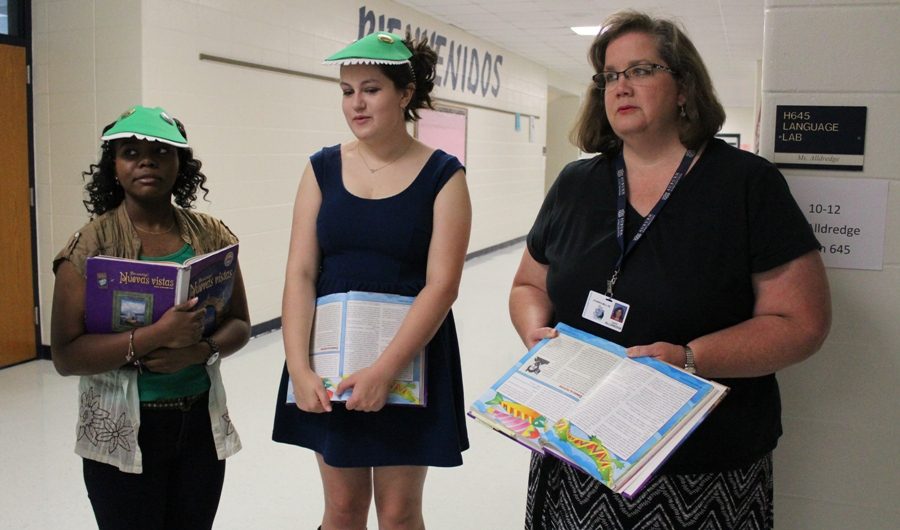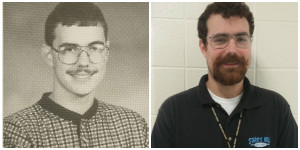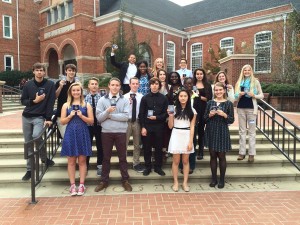Why teach?
Teachers reflect on inspiration to enter the educational field
Spanish teacher Laura Alldredge prepares some of her Spanish IV students for a skit they are performing in their class. One of the reasons teachers enjoy teaching as a profession is the interaction with students and being able to impact their lives in a classroom setting.
October 6, 2016
For years, Starr’s Mill High School has been among the most distinguished schools in the state of Georgia. According to US News and World Report, the Mill is ranked 31st in the state for best high school. The success of the Mill is a direct reflection of the faculty which works endlessly to ensure the success of their students. However, these teachers used to be students as well.
Whether it be a role model or change of plans, all of these teachers have a story of how they entered the educational profession. “Teachers have the potential to influence the lives of thousands of students over their career, and can do so in a variety of ways: in the classroom, as a coach and as a club sponsor,”psychology and sociology teacher Sean Hickey said. “Embrace opportunities to positively reinforce students in as many aspects as possible.”
Hickey is an alumnus of the Mill, and he graduated in the year 2000. As a student, Hickey appreciated the subject of social studies. “I have always enjoyed social studies [because it’s the] fusion of the interaction of people, cultures, behavior and world events,” Hickey said. “I believe social studies is a discipline that continues to impact students no matter their age.”
He drew inspiration from his teachers during his educational career. “I had excellent social studies teachers in middle school and high school. They explained to me that they saw a passion for explaining events and the importance of why those events occurred,” Hickey said.
What Hickey likes most about teaching is “seeing the appreciation of knowledge in my students and the application of that knowledge in their daily lives to make the world a more prosocial place,” Hickey said.
Some teachers have grown up around the educational profession. Science department chair and physics and chemistry teacher Dan Gant came from a family of teachers, contributing to and motivating his decision through seeing others in this occupation. “I’ve always known that God placed me on the earth to be a servant to others so I wanted to be in a profession where I was able to help others,” Gant said.
Gant also took a break from teaching to pursue a position at Delta Airlines, but after 16 years he returned to the Mill to continue teaching.“I left because I was making very little money as a teacher and got a raise to go to Delta. I was successful at Delta but I was never content. When I returned to teaching a lot had changed about the profession and my wife was concerned that I wouldn’t like it anymore. Automation was new and teaching had become ‘standards based’,” Gant said. “What hadn’t changed, however, were the kids. Some of their issues had changed but how to motivate them and excite them about learning was really the same.”
Motivated by his experiences in high school, Gant was determined to prepare his students in a more efficient manner for the next level. “I had a chemistry and physics teacher in high school who was a very nice lady, but she was a horrible teacher. Very knowledgeable but just couldn’t get it across to us students,” Gant said. “When I was in high school I didn’t really care that I wasn’t learning anything, but when I got to college, I cared. I was way behind other students in their classroom knowledge and their lab skills. I decided then that there was no way I could do worse than her so I was going to teach.”
Gant’s decision to teach science was based on the importance of this subject and its impact on the world. “I was going to teach science because I felt like everyone needed basic knowledge of science in order to understand the world and themselves. This is also why I do so many labs in class and why I teach every second of every day,” Gant said. “I’m determined to give students a better chance of succeeding at the next level than I had.”
Along with Gant, Spanish teacher Laura Alldredge enjoys interacting with students and impacting their lives through classroom material. “You have the ability to impact the lives of countless students, and that is what makes it all worthwhile. I love forming relationships with the young people that I teach and making sure that they know that I care about them. That’s the best part of my job and I wouldn’t trade it for the world,” Alldredge said.
Alldredge was inspired by her high school teachers and some of her college professors to choose a career in education. “They cared about their students and took an interest in us and in all of our endeavors, not just what we were doing in their particular classes,” Alldredge said. “My high school Spanish teachers, Valarie Forster and Jim Tate, were my favorite teachers and they inspired me to become a Spanish teacher. They made the classes fun, were approachable and caring, and really made an impact in our lives.”
She was hesitant at first at the idea of becoming a teacher. “I had fallen in love with the language and the culture because of them, but had been a little discouraged from becoming a teacher. So, when I started at Auburn, I started off in international trade,” Alldredge said. “I quickly realized that the business courses were not for me and that I really wanted to teach, so I switched to Spanish. I completed what was called the Dual Objectives program which allowed me to get my degree in Spanish but still meet all the requirements of the college of education to become a teacher.”
Another teacher who had a different route in mind before pursuing a career in education is AP calculus and pre-calculus teacher JB Campbell. “I really thought that I would end up as a pharmacist, since my dad was one, and I had grown up around and working in pharmacies,” Campbell said.
In high school, Campbell discovered his gift for teaching through helping his friends in class. Additional inspiration came from the teachers he had as a teenager and early adult. “I enjoyed helping my friends in high school with their math homework and they said I was good at it, so I went to college with teaching math in mind. There really wasn’t anything else that I enjoyed and felt competent explaining to others,” Campbell said. “However, I had great math teachers my junior and senior year of high school, and an amazing professor in college who challenged me daily. I probably try and emulate him most of all.”
Campbell takes delight in working with his students as well as the summer months off. “I enjoy sharing my love of mathematics with students and explaining difficult mathematical concepts in a way that hopefully makes them easy to understand. I also enjoy sharing life lessons that I have learned with my students whenever they fit into the discussion for the day,” Campbell said. “But the best part of the job has to be working with the amazing and talented students found at Starr’s Mill, and of course the 65 plus consecutive days off in the summertime to get refreshed before the next school year.”
Teachers love seeing the success of their students beyond high school. “I like seeing my students become successful at the next level. Sometimes that next level is just the next year of high school, sometimes it is college, sometimes it is with their profession, but it’s nice to see them being happy and successful and productive,” Gant said. “My students will often tell me they will come by to see me and my response, generally, is ‘That’s okay. Go live your life, be busy, and be productive’. I do enjoy talking with them, catching up on Facebook, or reading about them in the paper, and knowing that there are [Starr’s Mill] alumni who are making an impact on the world.”
For those considering a career in education, “I would encourage students to spend as much time teaching as possible before deciding to make a career out of it. You only get a two week trial run one semester as well as a semester of student teaching, and this comes at the end of your undergraduate degree,” Campbell said. “Volunteer to tutor students, lead study groups, teach Sunday school, anything at all to gain experience in conducting a lesson and managing a class. My other advice would be to earn a degree outside of education, but while in school, take the courses necessary to be a certified teacher.”
Students can tend to take advantage of or have a lack of respect for their teachers, but teachers are at the core of a quality education and influence their students’ future endeavors.
“We all teach for those ‘AH HAH’ moments when the realization of what we are teaching suddenly clicks with a student and they understand the concept and the reason why they are learning the information,” Gant said. “Those are the days that make the long afternoons, nights and weekends of preparing for class by studying the material, preparing lesson plans and grading papers all worthwhile.”








